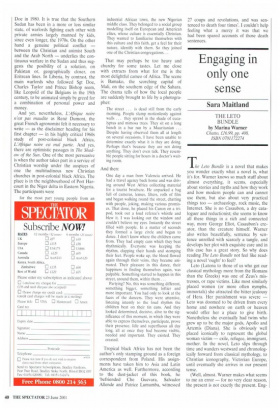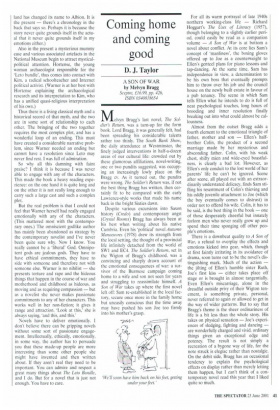Engaging in only one sense
Sara Maitland
THE LETO BUNDLE by Marina Warner Chatto, £16.99, pp. 408, ISBN 0701172274 he Leto Bundle is a novel that makes you wonder exactly what a novel is, what it's for. Warner knows so much stuff about almost everything, it seems, especially about stories and myths and how they work and how modem people can and cannot use them, but also about very practical things too — archaeology, rock music, the Internet. She is no Casaubon, a dry cataloguer and reductionist; she seems to know all these things in a rich and connected way, more George Eliot, Casaubon's creator, than the creature himself. Warner also writes beautifully, sentence by sentence unrolled with scarcely a tangle, and develops her plot with exquisite care and in this case has a great story. So why does reading The Leto Bundle not feel like reading a novel 'ought' to feel?
Leto (Latona to those of us who got our classical mythology more from the Romans than the Greeks) was one of Zeus's mistresses, or rape victims. Like most similarly placed women (or more often nymphs, immortals) she attracted the bitter jealousy of Hera. Her punishment was severe — Leto was doomed to be driven from every home and nowhere on earth or heaven would offer her a place to give birth. Nonetheless she eventually had twins who grew up to be the major gods, Apollo and Artemis (Diana). She is obviously well placed iconically to represent the global woman victim — exile, refugee, immigrant, mother. In the novel, Leto slips through time and wanders westward and chronologically forward from classical mythology, to Christian iconography, Victorian Europe, until eventually she arrives in our present tense.
(Well, almost. Warner makes what seems to me an error — for no very clear reason, the present is not exactly the present. Eng land has changed its name to Albion. It is the present — there's a chronology in the back that says so. Perhaps it is because the story never quite grounds itself in the actual that it never quite grounds itself in my emotions either.) Also in the present a mysterious mummy case and various associated artefacts in the National Museum begin to attract mysticalpolitical attention. Hortense, the young woman archaeologist responsible for the 'Leto bundle', thus comes into contact with Kim, a radical schoolteacher and Internet political activist. (Warner is at her best with Hortense explaining the archaeological research and its interpretation to Kim, who has a unified quasi-religious interpretation of his own.) Thus there is a living classical myth and a historical record of that myth, and the two are in some sort of relationship to each other. The bringing of the two together requires the most complex plot, and has a wonderful loop of an ending. This must have created a considerable narrative problem, since Warner needed an ending but cannot have a resolution since Leto may never find rest. I was full of admiration.
So why all this damning with faint praise? I think it is because I was never able to engage with any of the characters. This made the book a heavy reading experience: on the one hand it is quite long and on the other it is not really long enough to carry such a large cast and such a complex plot.
But the real problem is that I could not feel that Warner herself had really engaged emotionally with any of the characters. (This mattered most with the contemporary ones.) The omniscient godlike author has mainly been abandoned as strategy by the contemporary novelist and I've never been quite sure why. Now I know. You really cannot be a 'liberal' God. Omnipotent gods are jealous gods. They have to have ethical commitments, they have to side with someone and therefore not with someone else. Warner is no nihilist — she presents torture and rape and the hideous things that happen in the course of war and motherhood and childhood as hideous, as moving and as requiring compassion — but as a novelist she never makes passionate commitments to any of her characters. This works well in her non-fiction; it gives it range and attraction. 'Look at this,' she is always saying, 'and this, and this,'
Novels have to deliver emotionally. I don't believe there can be gripping novels without some sort of passionate engagement. Intellectually, ethically, emotionally, in some way, the author has to persuade you that these made-up people are more interesting than some other people she might have invented and then written about. If they aren't real they need to be important. You can admire and respect a great many things about The Leto Bundle, and I do. But for a novel that is just not enough. You have to care.



































































 Previous page
Previous page